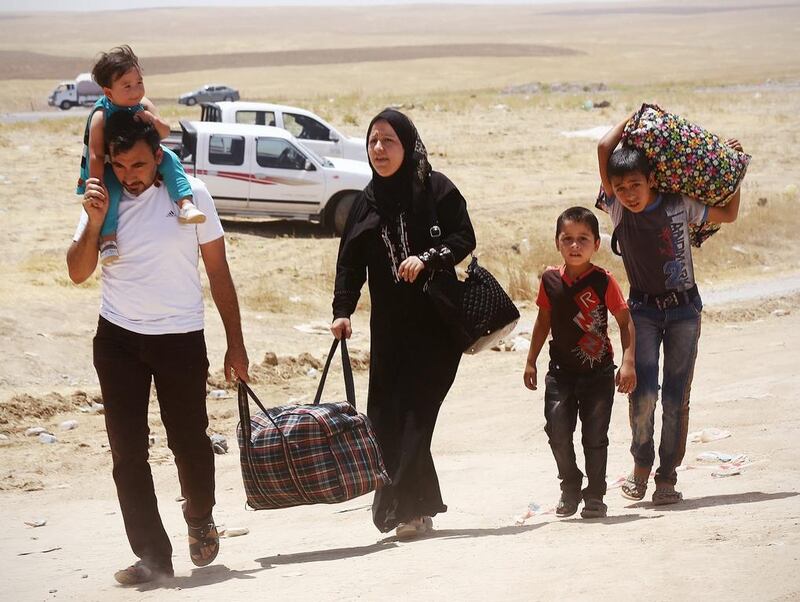The violence in Iraq has boosted oil prices and dampened the region's stock markets. There can be a tendency among foreign investors to think of the region as a homogenous unit, but what does the fighting in Iraq mean for the economy of the UAE?
With US$2.5 billion in multilateral trade, Iraq ranks seventh among the UAE’s trading partners. Most of this trade has been channelled to the country’s semi-autonomous Kurdish region.
Violence and bombings, coupled with corruption and political views that diverge from Baghdad’s Shia-led government, have deterred the flow of capital from the GCC.
The UAE is largely, though not completely, insulated against economic repercussions from the turmoil in Iraq.
With an Iraqi expat community amounting to a bit more than 55,000, the UAE with its pragmatic foreign policy and commercial mindset stands out from its neighbours, Mowafak Mahdo Abboud, Iraq’s ambassador to the UAE, said in an interview with The National.
Instead of refraining from investing in Iraq, the UAE recognised that “the Kurdish region was a gateway to the rest of Iraq without the baggage of political risk”. There are more than 130 registered Emirati companies in the Kurdish region in an array of sectors from hospitality to oil and gas.
But last week, developments took a drastic turn after a militant group known as the Islamic State of Iraq and the Levant captured Mosul, Iraq’s second-biggest city by population, which borders the Kurdish region. The development prompted a mass evacuation of foreign staff working in the region, some of whom had worked for UAE companies.
Iraq’s prime minister, Nouri Al Maliki, on Tuesday blamed Saudi Arabia for fomenting sectarianism and igniting the crisis, an accusation that the kingdom denies.
The UAE was prompted on Wednesday to recall its ambassador, citing “serious concern” about” exclusionary and sectarian policies”, according to the UAE’s Ministry of Foreign Affairs.
Abu Dhabi National Energy, also known as Taqa, had $1.2bn invested in Kurdistan’s oilfields and had plans to power oilfields in central Iraq
“There was a plan to invest in the south, but that never materialised,” said a source who spoke on condition of anonymity. “But at this point, it wouldn’t happen for political reasons.”
Beyond the breakdown in relations between Iraq’s government, seen as under the orbit of Iran, and GCC states, energy companies that have operated in the Kurdish region have been victim to the political squabbling between the Kurdish capital, Erbil, and Baghdad.
Iraq’s government believes petroleum policy should be set at the federal level and comply with its interpretation of the constitution. Erbil, in contrast, wants to be able to award production contracts and plan export pipelines on its own terms. As such, Iraq has delayed payments to the Kurdish region, which has hurt companies operating there.
Dana Gas, the Sharjah-based explorer and producer, is in arbitration proceedings with the Kurdish Regional Government in the London Court of International Arbitration, along with its partners Crescent and Pearl Petroleum.
Dana Gas said last month that it was owed $583 million at the end of the first quarter.
Damac’s $15bn project in Erbil was cancelled in 2010, while Emaar’s Downtown Erbil project has faced delays.
“With short-term thinking and lack of respect for agreements, Kurdistan will never create a sustainable investment climate. And now that Dubai is back and the political risk looks higher in Iraq, the trend is against them,” said a prominent Dubai businessman who spoke on condition of anonymity.
According to Capital Economics, the economies most vulnerable to Iraq’s turmoil are Lebanon and Jordan, whose exports are equivalent to 3.7 per cent of GDP. “The crisis in Iraq comes at a time that both the Lebanese and Jordanian economies have struggled against the backdrop of the civil war in neighbouring Syria,” the London-based research house said in a note to clients last week.
For now, though, the concern of many people working in Iraq is about safety – and business will have to wait until order is restored.
Ernest Williams, a 25-year veteran of the US military who served in the Gulf War and after the US-led invasion, now runs a training programme in Dubai for business owners operating in conflict zones. He said the country’s tensions now were the worst he has seen them.
“Everyone’s leaving Iraq right now,” he said. “Once things stabilise then people will start calling us. But then we will have to be flexible again, as we’ll have to send people in to understand what’s happening on the ground.”
halsayegh@thenational.ae
* Additional reporting by Tom Arnold





